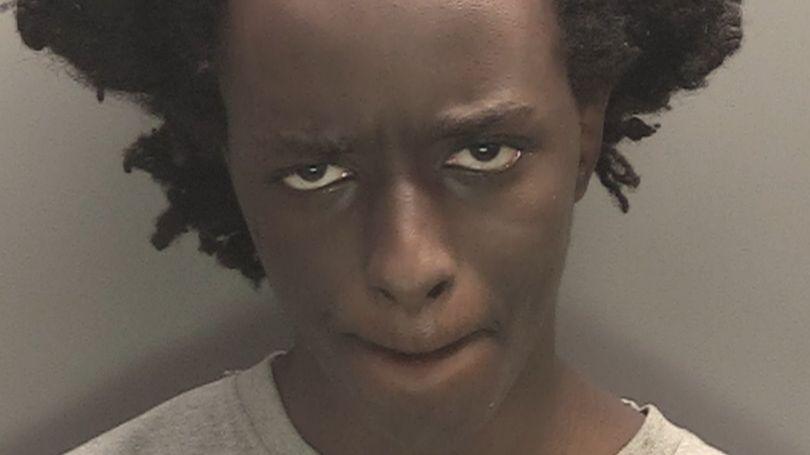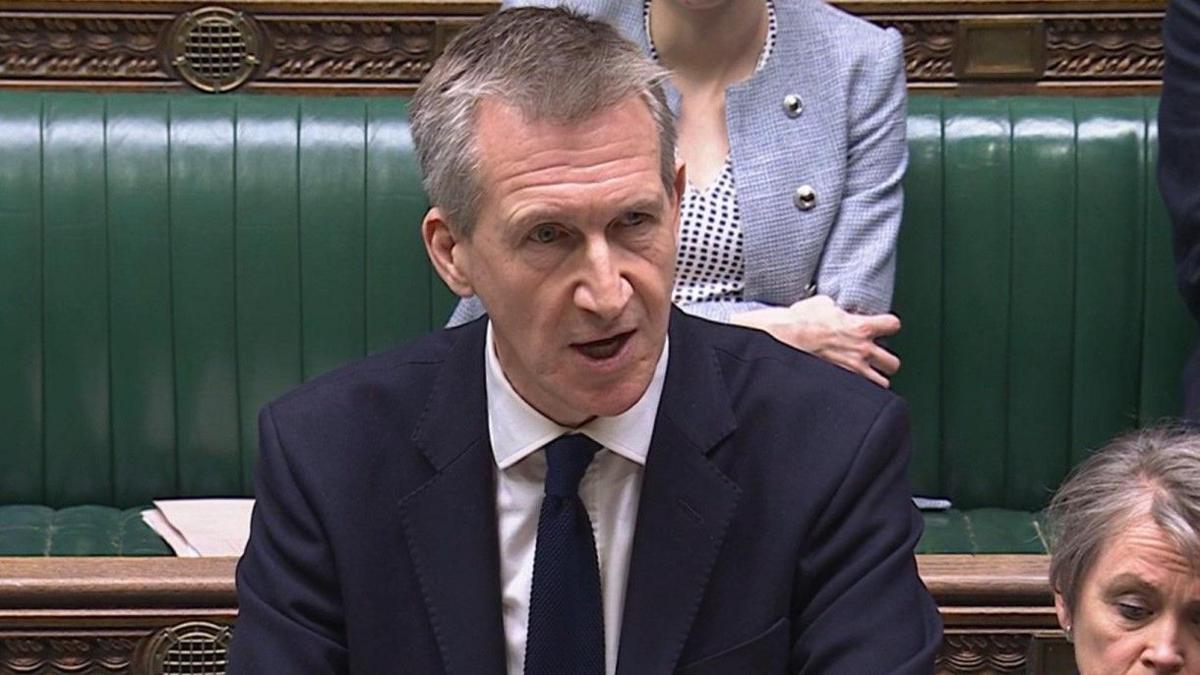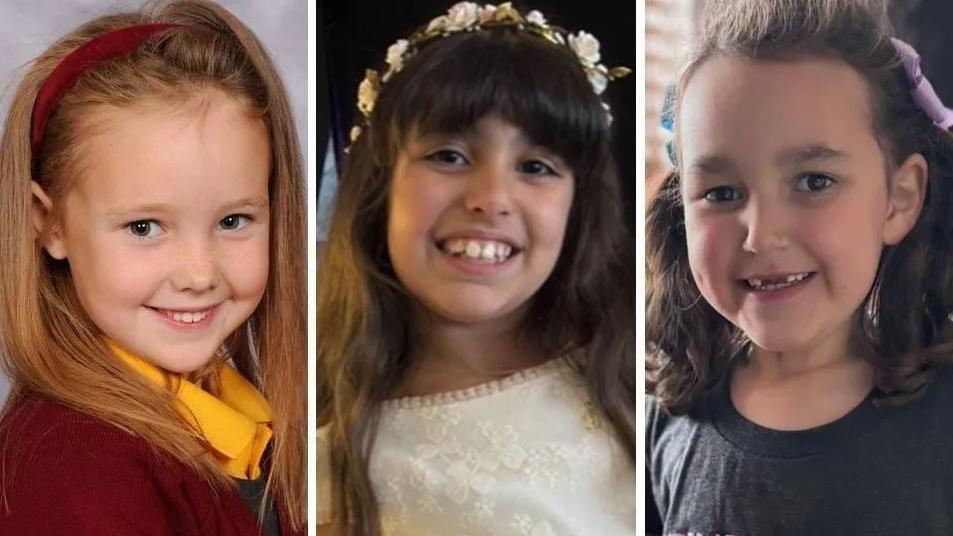Prevent closed Southport killer case 'prematurely'

Axel Rudakubana had been referred to the Prevent anti-terror scheme three times between 2019 and 2021
- Published
The Prevent counter-terrorism scheme "prematurely" closed its case on Axel Rudakubana three years before he went on to murder three children in Southport, a government review has found.
Security minister Dan Jarvis MP told the House of Commons Rudakubana had already discussed the Manchester Arena bombing and stabbing people when Prevent decided to end its involvement with him.
The killer was referred to Prevent three times between 2019 and 2021 due to his interest in terrorist attacks and school shootings, but there was no evidence of a fixed ideology or motivation.
Rudakubana was 17 when he stabbed 11 children and two adults, killing nine-year-old Alice da Silva Aguiar, Elsie Dot Stancombe, seven, and six-year-old Bebe King.
He was jailed in January for a minimum of 52 years after admitting the three murders, the attempted murders of the other children and the adults, production of ricin, possession of an al-Qaeda training manual and possession of a knife.

Security minister Dan Jarvis said the government had kept the families of the Southport victims informed ahead of the report's publication
The learning review found counter terrorism officers staffing the Prevent scheme had "sufficient information" to escalate his case to the next stage - known as Channel - which would have included enhanced monitoring.
Mr Jarvis said: "The review concluded that too much focus was placed on the absence of a distinct ideology, to the detriment of considering the perpetrator's susceptibility, grievances and complex needs."
Mr Jarvis added the "importance of the families needing answers" meant that the Home Office was taking the "unusual step" of publishing its findings, which he said are normally technical documents circulated internally.
Southport MP Patrick Hurley told the chamber "it beggared belief" that Rudakubana's name was spelled incorrectly on the Prevent database, which, the report found, had the potential to mean previous referrals would not show up in searches.
The review said while officers at Prevent had shown a "high level of compliance" with policies in place at the time, it criticised the focus on Rudakubana's ideology.
While there was no evidence of political or religious motivation, Rudakubana was obsessed with violence and his case should have been escalated as an example of what was then referred to as "mixed unclear and unstable ideology".
His first referral to Prevent in December 2019, when he was 13, was made by The Acorns special school where he was a pupil after being expelled from Range High School in Formby for carrying a knife.
In its analysis of that referral, the report stated: "He was conducting searches using the school's internet on school shootings in America, was talking about drawing guns and searching on the internet for guns in another lesson, was also overheard talking to a pupil about watching videos of people hurting themselves and made a graphic comment about a drill bit breaking and killing someone.
"It is not known if this special interest in school shooting, violence and injury amounted to a fascination as this interest may not have been fully explored and understood."

Elsie Dot Stancombe, Alice da Silva Aguair and Bebe King were among 26 children at the Taylor Swift themed dance class when Rudakubana attacked
Rudakubana was referred to Prevent a second time in February 2021 when staff at Range High School contacted Acorns to say a pupil had reported social media posts by the teenager about Libyan dictator Muammar Gaddafi.
The referral was dealt with "swiftly", with the officer writing that the posts did "not suggest he holds any extremist ideology".
However the review stated: "This referral was closed without the level of professional curiosity expected bearing in mind this was a second referral.
"There were no policies in place or guidance regarding repeat or multiple referrals at the time although it was widely considered to be a potential increase in risk."
It noted that the repeat referral issue was being "discussed as far back as 2014".
It also noted that a supervisor, checking the decision to close the second referral, had been unable to find the first referral on the system due to a spelling error in Rudakubana's name - which had been entered on the database as 'Rudukubana'.
'Knee-jerk'
The third referral, in April 2021, was made when a teacher at The Acorns noted he had been researching the London Bridge terror attacks.
However it was closed two weeks later, with an officer at Prevent suggesting the referral had been a "knee-jerk reaction" by the school because it had been advised to make a new referral if any further concerns arose.
The officer also noted that Rudakubana had been diagnosed with an autism spectrum disorder (ASD), and said the way to address his "vulnerabilities" may lie outside of the Prevent scheme.
However the review stated: "[Rudakubana's] potential ASD and 'special interest', which frequently are combined, are part of the reasons that make him susceptible to being drawn into terrorism.
"When taken in context the potential special interests in mass killings, terrorist acts, and a capability to commit violence, then there is a potential vulnerability to being drawn into terrorism."
Home Secretary Yvette Cooper had already announced a full public inquiry into the Southport killings, including how all agencies dealt with Rudakubana.
Mr Jarvis told the chamber that more details would be shared next month.
Matt Jukes, head of Counter Terrorism Policing, said changes had been made to how multiple referrals to Prevent are dealt with since 2021.
"Around the world, we are seeing growing numbers of young people drawn not only to terrorism but also into extreme violence online of all forms, and contending with mental health and social challenges," he said.
"As others have recognised, as well as ensuring Prevent plays its part, new interventions for young people fixated on violence rather than terrorist ideology are needed, and their cases should have a clear home.
"They should not be passed from organisation to organisation."
Get in touch
Tell us which stories we should cover on Merseyside
Listen to the best of BBC Radio Merseyside on BBC Sounds and follow BBC Merseyside on Facebook, external, X, external, and Instagram, external, and watch BBC North West Tonight on BBC iPlayer